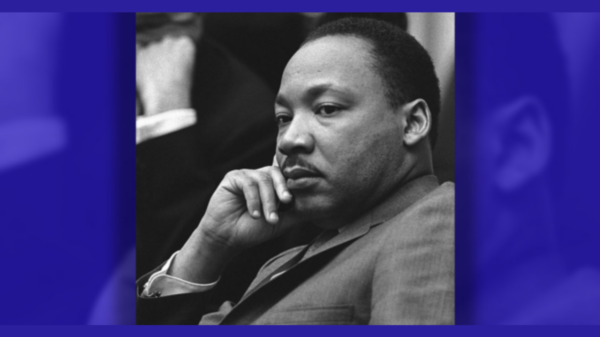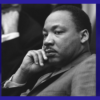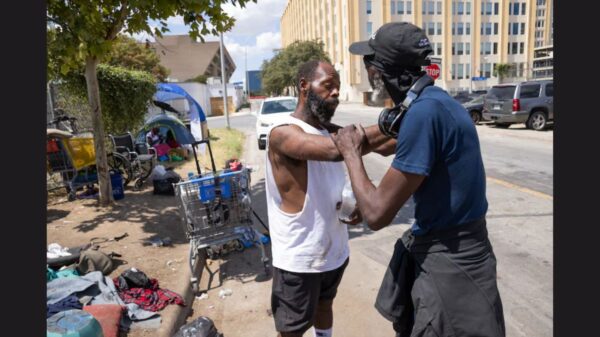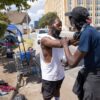By Charlene Crowell
Forward Times
https://www.forwardtimes.com/

The year 2025 marks the nation’s 39th observance of a national holiday honoring Dr. Martin Luther King, Jr. Ironically, the still-beloved minister and martyr was only 39 years old age when an assassin’s bullet took his life on April 4, 1968.
While many will rightly recall his valiant civil rights activism, his equally vigilant call for economic justice remains as urgent today as it was decades ago.
Where Do We Go from Here: Chaos or Community?, Dr. Martin Luther King, Jr.’s fourth and final book was published in 1967 after a decade of activism that led to the enactment of federal laws on civil rights (1964), and voting rights (1965). Despite notable and significant victories, he wrote of the unfinished journey that America still faced, and was morally-bound to pursue.
“There is nothing to prevent us from paying adequate wages to schoolteachers, social workers and other servants of the public to ensure that we have the best available personnel in these positions which are charged with the responsibility of guiding our future generations,” wrote Dr. King.
“Let us be dissatisfied until America will no longer have high blood pressure of creeds and an anemia of deeds. Let us be dissatisfied until the tragic walls that separate the outer city of wealth and comfort from the inner city of poverty and despair shall be crushed by the battering rams of the fires of justice.”
Multiple and recent research reports highlight in precise terms many of the ways Black America remains economically shortchanged.
Across the country, local communities continue to struggle with the still-rising costs of housing and homelessness. In 2024, about 23 of every 10,000 people in the United States – experienced homelessness in an emergency shelter, safe haven, transitional housing program, or in unsheltered locations across the country, according to the most recent report by the Department of Housing & Urban Development (HUD). Further, although Blacks comprise just 12 percent of the nation’s population, and 21 percent of the country’s poor, we bear a disproportionate 32 percent of all people experiencing homelessness.
In times past, America’s homeless were frequently veterans. But in the past year, children under the age of 18 represented a 33 percent increase in homelessness, the single largest surge, while that of veterans dropped by eight percent, according to HUD.
“Sadly, we know exactly how we got here”, said Congresswoman Maxine Waters in reaction to the disturbing findings. “For decades, a lack of investment in affordable housing has forced countless families out of their homes and onto the streets. This is a crisis in every county and city across America, whether they be rural, urban, or suburban communities.”
For generations of Black Americans, higher education has long been viewed as a ladder away from poverty. But today, millions who dedicated time and energies in pursuit of higher education remain mired in unsustainable and long-term debt. Among Black college graduates, the detrimental effects of historic economic disparities are particularly severe for those who attended Historically Black Colleges and Universities (HBCUs).
“Paying from the Grave”: Historically Black Colleges and Universities (HBCU) Alumni and the Burden of Student Loan Debt, a 2022 report by the Center for Responsible Lending tracked nagging and extensive economic hardships borne from heavy student debt.
“Representing only 3 percent of the nation’s colleges and universities, HBCUs enroll 9 percent of all Black students and award 13 percent of all bachelor’s degrees earned by Black students,” states the report.
“HBCU graduates are more likely to use loans to pay for college and to borrow greater amounts than non-HBCU graduates,” the report continues. “Taking on a large debt at an early age impacts lifetime earnings and generational wealth by delaying or preventing the opportunity to buy a home, start a business, or invest in retirement, thereby widening the racial wealth gap.”
Unfortunately, Black America’s saga with student debt extends into the older years of many consumers, according to the New York Federal Reserve Bank. Its analysis of indebtedness by generation showed although borrowers ages 35 to 49 ($635 billion) and those ages 25 to 34 ($490 billion) held the highest debt in dollars, significant billion-dollar debt was still owed by borrowers ages 50 to 61 ($284.5 billion), and 62 and older ($116 billion).
This high level of debt that extends over multiple decades makes building wealth or some measure of financial stability that much harder for Black America. As this column recently reported, a report by the National Association of Real Estate Brokers (NAREB) detailed how owning a home – the nation’s most reliable building-block to wealth – shortchanges Black America yet again. In fact, the 400 wealthiest Americans control the same wealth as all 48 million Blacks.
These and other contemporary economic challenges were prophetically championed by Dr. King.
“When machines and computers, profit motives and property rights are considered more important than people the giant triplets of racism, economic exploitation and militarism are incapable of being conquered,” Dr. King foretold in a speech entitled, The Three Evils of Society. “A civilization can flounder as readily in the face of moral bankruptcy as it can through financial bankruptcy.”
In a few weeks, Congress must wrestle with both a recurring debt limit and budget priorities as authorization on each face a ticking time clock.
“Freedom is not won by a passive acceptance of suffering,” wrote Dr. King in his final book. “Freedom is won by a struggle against suffering. By this measure, Negroes have not yet paid the full price for freedom. And whites have not yet faced the full cost of justice.”
Amen, Dr. King.









You must be logged in to post a comment Login